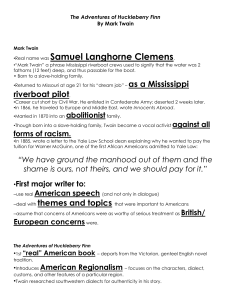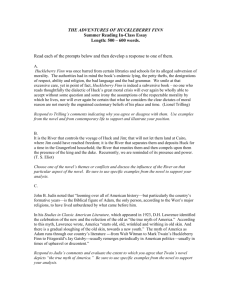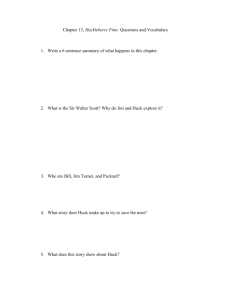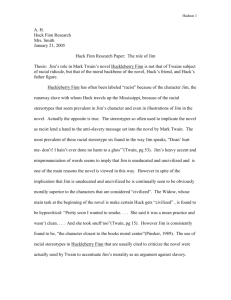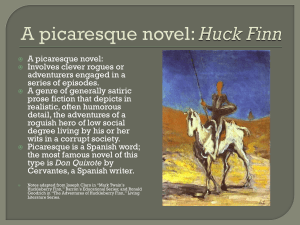Morality and Adventures of Huckleberry Finn
advertisement
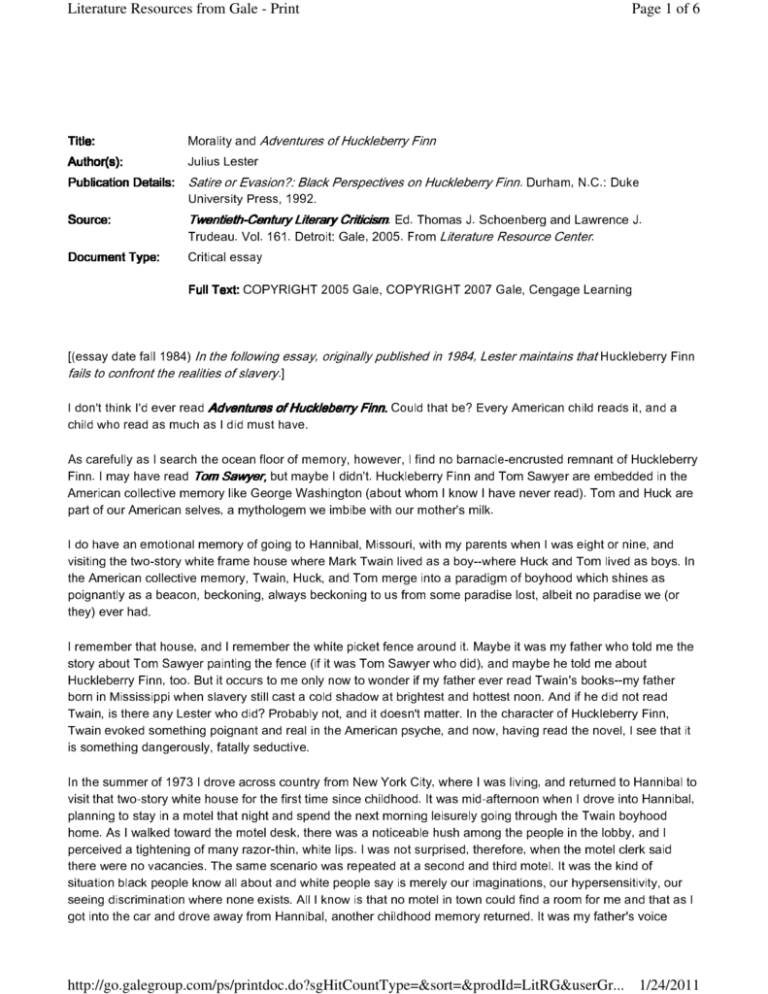
Literature Resources from Gale - Print Page 1 of 6 Title: Morality and Adventures of Huckleberry Finn Author(s): Julius Lester Publication Details: Satire or Evasion?: Black Perspectives on Huckleberry Finn. Durham, N.C.: Duke University Press, 1992. Source: TwentiethTwentieth-Century Literary Criticism. Ed. Thomas J. Schoenberg and Lawrence J. Trudeau. Vol. 161. Detroit: Gale, 2005. From Document Type: Literature Resource Center. Critical essay Full Text: COPYRIGHT 2005 Gale, COPYRIGHT 2007 Gale, Cengage Learning In the following essay, originally published in 1984, Lester maintains that Huckleberry Finn fails to confront the realities of slavery.] [(essay date fall 1984) I don't think I'd ever read Adventures of Huckleberry Finn. Could that be? Every American child reads it, and a child who read as much as I did must have. As carefully as I search the ocean floor of memory, however, I find no barnacle-encrusted remnant of Huckleberry Finn. I may have read Tom Sawyer, but maybe I didn't. Huckleberry Finn and Tom Sawyer are embedded in the American collective memory like George Washington (about whom I know I have never read). Tom and Huck are part of our American selves, a mythologem we imbibe with our mother's milk. I do have an emotional memory of going to Hannibal, Missouri, with my parents when I was eight or nine, and visiting the two-story white frame house where Mark Twain lived as a boy--where Huck and Tom lived as boys. In the American collective memory, Twain, Huck, and Tom merge into a paradigm of boyhood which shines as poignantly as a beacon, beckoning, always beckoning to us from some paradise lost, albeit no paradise we (or they) ever had. I remember that house, and I remember the white picket fence around it. Maybe it was my father who told me the story about Tom Sawyer painting the fence (if it was Tom Sawyer who did), and maybe he told me about Huckleberry Finn, too. But it occurs to me only now to wonder if my father ever read Twain's books--my father born in Mississippi when slavery still cast a cold shadow at brightest and hottest noon. And if he did not read Twain, is there any Lester who did? Probably not, and it doesn't matter. In the character of Huckleberry Finn, Twain evoked something poignant and real in the American psyche, and now, having read the novel, I see that it is something dangerously, fatally seductive. In the summer of 1973 I drove across country from New York City, where I was living, and returned to Hannibal to visit that two-story white house for the first time since childhood. It was mid-afternoon when I drove into Hannibal, planning to stay in a motel that night and spend the next morning leisurely going through the Twain boyhood home. As I walked toward the motel desk, there was a noticeable hush among the people in the lobby, and I perceived a tightening of many razor-thin, white lips. I was not surprised, therefore, when the motel clerk said there were no vacancies. The same scenario was repeated at a second and third motel. It was the kind of situation black people know all about and white people say is merely our imaginations, our hypersensitivity, our seeing discrimination where none exists. All I know is that no motel in town could find a room for me and that as I got into the car and drove away from Hannibal, another childhood memory returned. It was my father's voice http://go.galegroup.com/ps/printdoc.do?sgHitCountType=&sort=&prodId=LitRG&userGr... 1/24/2011 Literature Resources from Gale - Print Page 2 of 6 reminding me that "Hannibal is rough on Negroes." That's the kind of thing that can happen to a black person when the American collective memory subsumes black reality, when you remember Huck shining brightly and forget to keep an eye on what (or who) may be lurking in the shadows. I am grateful that among the many indignities inflicted on me in childhood, I escaped Huckleberry Finn. As a black parent, however, I sympathize with those who want the book banned, or at least removed from required reading lists in schools. While I am opposed to book banning, I know that my children's education will be enhanced by not reading Huckleberry Finn. It is, in John Gardner's phrase, a "well-meant, noble sounding error" that "devalue[s] the world." 1 That may sound harsh and moralistic, but I cannot separate literature, no matter how well written, from morality. By morality I do not mean bourgeois mores, which seek to govern the behavior of others in order to create (or coerce) that conformity thought necessary for social cohesion. The truly moral is far broader, far more difficult, and less certain of itself than bourgeois morality, because it is not concerned with the "what" of behavior but with the spirit we bring to our living, and, by implication, to literature. Gardner put it this way: "We recognize true art by its careful, thoroughly honest research for and analysis of values. It is not didactic because, instead of teaching by authority and force, it explores, open-mindedly, to learn what it should teach. It clarifies and confirms. ... [M]oral art tests values and rouses trustworthy feelings about the better and the worse in human action." 2 It is in this sense, then, that morality can and should be one of the criteria for assessing literature. It must be if a book is to "serve as the axe for the frozen sea within us," as Kafka wrote. Adventures of Huckleberry Finn is not the axe; it is the frozen sea, immoral in its major premises, one of which demeans blacks and insults history. Twain makes an odious parallel between Huck's being "enslaved" by a drunken father who keeps him locked in a cabin and Jim's legal enslavement. Regardless of how awful and wrong it is for a boy to be held physically captive by his father, there is a profound difference between that and slavery. By making them into a parallelism, Twain applies a veneer to slavery which obscures the fact that, by definition, slavery was a horror. Such a parallelism also allowed Twain's contemporaries to comfortably evade responsibility and remorse for the horror they had made. A boy held captive by a drunken father is not in the same category of human experience as a man enslaved. Twain willfully refused to understand what it meant to be legally owned by another human being and to have that legal ownership supported by the full power of local, state, and federal government enforcement. Twain did not take slavery, and therefore black people, seriously. Even allowing for the fact that the novel is written from the limited first-person point of view of a fourteen-year-old boy (and at fourteen it is not possible to take anything seriously except oneself), the author must be held responsible for choosing to write from that particular point of view. If the novel had been written before emancipation, Huck's dilemma and conflicting feelings over Jim's escape would have been moving. But in 1884 slavery was legally over. Huck's almost Hamlet-like interior monologues on the rights and wrongs of helping Jim escape are not proof of liberalism or compassion, but evidence of an inability to relinquish whiteness as a badge of superiority. "I knowed he was white inside," is Huck's final assessment of Jim (chap. 40). Jim does not exist with an integrity of his own. He is a childlike person who, in attitude and character, is more like one of the boys in Tom Sawyer's gang than a grown man with a wife and children, an important fact we do not learn until much later. But to Twain, slavery was not an emotional reality to be explored extensively or with love. The novel plays with black reality from the moment Jim runs away and does not immediately seek his freedom. It http://go.galegroup.com/ps/printdoc.do?sgHitCountType=&sort=&prodId=LitRG&userGr... 1/24/2011 Literature Resources from Gale - Print Page 3 of 6 defies logic that Jim did not know Illinois was a free state. Yet Twain wants us not only to believe he didn't, but to accept as credible that a runaway slave would drift south down the Mississippi River, the only route to freedom he knew being at Cairo, Illinois, where the Ohio River meets the Mississippi. If Jim knew that the Ohio met the Mississippi at Cairo, how could he not have known of the closer proximity of freedom to the east in Illinois or north in Iowa? If the reader must suspend intelligence to accept this, intelligence has to be dispensed with altogether to believe that Jim, having unknowingly passed the confluence of the Ohio and Mississippi Rivers, would continue down the river and go deeper and deeper into the heart of slave country. A century of white readers have accepted this as credible, a grim reminder of the abysmal feelings of superiority with which whites are burdened. The least we expect of a novel is that it be credible--if not wholly in fact, then in emotion; for it is emotions that are the true subject matter of fiction. As Jim floats down the river farther and farther into slave country, without anxiety about his fate and without making the least effort to reverse matters, we leave the realm of factual and emotional credibility and enter the all-too-familiar one of white fantasy in which blacks have all the humanity of Cabbage Patch dolls. The novel's climax comes when Jim is sold and Tom and Huck concoct a ridiculous scheme to free him. During the course of the rescue, Tom Sawyer is shot. Huck sends the doctor, who cannot administer to Tom alone. Jim comes out of hiding and aids the doctor, knowing he will be recaptured. The doctor recounts the story this way: so I says, I got to have help, somehow; and the minute I says it, out crawls this nigger from somewheres, and says he'll help, and he done it, too, and done it very well. Of course I judged he was! and there I had to stick, right straight along, all the rest I never see a nigger that was a better nuss or faithfuller [emphasis must be a runaway nigger, and there I of the day, and all night. ... added], and yet he was resking his freedom to do it, and was all tired out, too, and I see plain enough he'd been worked main hard, lately. I liked the nigger for that; I tell you, gentlemen, a nigger like that is worth a thousand dollars--and kind treatment, too. ... there I was, ... and there I had to stick, till about dawn this morning; then some men in a skiff come by, and as good luck would have it, the nigger was setting by the pallet with his head propped on his knees, sound asleep; so I motioned them in, quiet, and they slipped up on him and grabbed him and tied him before he knowed what he was about, and we never had no trouble. ... the nigger never made the least row nor said a word, from the start. He ain't no bad nigger, gentlemen; that's what I think about him. (Chap. 42) This depiction of a black "hero" is familiar by now since it has been repeated in countless novels and films. It is a picture of the only kind of black that whites have ever truly liked--faithful, tending sick whites, not speaking, not causing trouble, and totally passive. He is the archetypal "good nigger," who lacks self-respect, dignity, and a sense of self separate from the one whites want him to have. A century of white readers have accepted this characterization because it permits their own "humanity" to shine with more luster. The depth of Twain's contempt for blacks is not revealed fully until Tom Sawyer clears up something that has confused Huck. When Huck first proposed freeing Jim, he was surprised that Tom agreed so readily. The reason Tom did so is because he knew all the while that Miss Watson had freed Jim when she died two months before. Once again credibility is slain. Early in the novel Jim's disappearance from the town coincided with Huck's. Huck, having manufactured "evidence" of his "murder" to cover his escape, learned that the townspeople believed that Jim had killed him. Yet we are now to believe that an old white lady would free a black slave suspected of murdering a white child. White people may want to believe such fairy tales about themselves, but blacks know better. But this is not the nadir of Twain's contempt, because when Aunt Sally asks Tom why he wanted to free Jim, http://go.galegroup.com/ps/printdoc.do?sgHitCountType=&sort=&prodId=LitRG&userGr... 1/24/2011 Literature Resources from Gale - Print Page 4 of 6 is a question, I must say; and just like women! Why, I adventure of it" (chap. 42). Now Huck understands why Tom was so eager to help Jim "escape." knowing he was already free, Tom replies: "Well that wanted the Tom goes on to explain that his plan was "for us to run him down the river, on the raft, and have adventures plumb to the mouth of the river." Then he and Huck would tell Jim he was free and take him "back up home on a steamboat, in style, and pay him for his lost time." They would tell everyone they were coming and "get out all the niggers around, and have them waltz him into town with a torchlight procession and a brass band, and then he would be a hero, and so would we" ("Chapter the Last"). There is no honor here; there is no feeling for or sense of what Gardner calls that which "is necessary to humanness." Jim is a plaything, an excuse for "the adventure of it," to be used as it suits the fancies of the white folk, whether that fancy be a journey on a raft down the river or a torchlight parade. What Jim clearly is not is a human being, and this is emphasized by the fact that Miss Watson's will frees Jim but makes no mention of his wife and children. Twain doesn't care about the lives the slaves actually lived. Because he doesn't care, he devalues the world. Every hero's proper function is to provide a noble image for men to be inspired by and guided by in their own actions; that is, the hero's business is to reveal what the gods require and love. ... [T]he hero's function ... is to set the standard in action ... the business of the poet (or "memory" ...) is to celebrate the work of the hero, pass the image on, keep the heroic model of behavior fresh, generation on generation. Criticizing 3 Adventures of Huckleberry Finn because of Twain's portrayal of blacks is almost too easy, and, some would add sotto voce, to be expected from a black writer. But a black writer accepts such arrogant dismissals before he or she sits down to write. We could not write otherwise. But let me not be cynical. Let me allow for the possibility that what I have written may be accepted as having more than a measure of truth. Yet doesn't Huckleberry Finn still deserve to be acknowledged as an American classic, eminently deserving of being read? The Council on Interracial Books for Children, while highly critical of the book, maintains "that much can be learned from this book--not only about the craft of writing and other issues commonly raised when the work is taught, but also about racism. ... Unless have racist results." 4 Huck Finn's racist and anti-racist messages are considered, the book can While it is flattering that the council goes on to recommend one of my books, To Be a Slave, as supplementary reading to correct Twain's portrayal of slavery, racism is not the most insidious and damaging of the book's flaws. In its very essence the book offends that morality which would give "a noble image ... to be inspired and guided by." If it is the hero's task "to reveal what the gods require and love," what do we learn from Adventures of Huckleberry Finn? The novel's major premise is established in the first chapter: "The widow Douglas, she took me for her son, and allowed she would sivilize me; but it was rough living in the house all the time, considering how dismal regular and decent the widow was in all her ways; so when I couldn't stand it no longer, I lit out. I got into my old rags, and my sugar-hogshead again, and was free and satisfied" (chap. 1). Civilization is equated with education, regularity, decency, and being "cramped up," and the representatives of civilization are women. Freedom is old clothes and doing what one wants to do. "All I wanted was a change, I warn't particular" (chap. 1). The fact that the novel is regarded as a classic tells us much about the psyche of the white American male, because the novel is a powerful evocation of the puer, the eternal boy for whom growth, maturity, and responsibility are enemies. There is no more powerful evocation in American literature of the eternal adolescent http://go.galegroup.com/ps/printdoc.do?sgHitCountType=&sort=&prodId=LitRG&userGr... 1/24/2011 Literature Resources from Gale - Print than Page 5 of 6 Adventures of Huckleberry Finn. It is a fantasy adolescence, however. Not only is it free of the usual adolescent problems caused by awakening sexuality, but also Huck has a verbal adroitness and cleverness beyond the capability of an actual fourteen-year-old. In the person of Huck, the novel exalts verbal cleverness, lying, and miseducation. The novel presents, with admiration, a model we (men) would and could be if not for the pernicious influence of civilization and women. In its lyrical descriptions of the river and life on the raft, the novel creates an almost primordial yearning for a life of freedom from responsibility: It was kind of solemn, drifting down the big still river, laying on our backs looking up at the stars, and we didn't ever feel like talking loud, and it warn't often that we laughed, only a little kind of low chuckle. We had mighty good weather, as a general thing, and nothing ever happened to us at all. (Chap. 12)Sometimes we'd have that whole river all to ourselves for the longest time. Yonder was the banks and the islands, across the water; and maybe a spark--which was a candle in a cabin window--and sometimes on the water you could see a spark or two--on a raft or a scow, you know; and maybe you could hear a fiddle or a song coming over from one of them crafts. It's lovely to live on a raft. We had the sky, up there, all speckled with stars, and we used to lay on our backs and look up at them, and discuss about whether they was made, or only just happened.(Chap. 19) It is in passages such as these that the book is most seductive in its quiet singing of the "natural" life over the life of "sivilization," which is another form of slavery for Huck. It is here also that the novel fails most profoundly as moral literature. Twain's notion of freedom is the simplistic one of freedom from restraint and responsibility. It is an adolescent vision of life, an exercise in nostalgia for the paradise that never was. Nowhere is this adolescent vision more clearly expressed than in the often-quoted and much-admired closing sentences of the book: "But I reckon I got to light out for the Territory ahead of the rest, because aunt Sally she's going to adopt me and sivilize me, and I can't stand it. I been there before." That's just the problem, Huck. You haven't "been there before." Then again, neither have too many other white American males, and that's the problem, too. They persist in clinging to the teat of adolescence long after only blood oozes from the nipples. They persist in believing that freedom from restraint and responsibility represents paradise. The eternal paradox is that this is a mockery of freedom, a void. We express the deepest caring for this world and ourselves only by taking responsibility for ourselves and whatever portion of this world we make ours. Twain's failure is that he does not care until it hurts, and because he doesn't, his contempt for humanity is disguised as satire, as humor. No matter how charming and appealing Huck is, Twain holds him in contempt. And here we come to the other paradox, the critical one that white Americans have so assiduously resisted: it is not possible to regard blacks with contempt without having first so regarded themselves. To be moral. It takes an enormous effort of will to be moral, and that's another paradox. Only to the extent that we make the effort to be moral do we grow away from adolescent notions of freedom and begin to see that the true nature of freedom does not lie in "striking out for the territory ahead" but resides where it always has--in the territory within. Only there does one begin to live with oneself with that seriousness from which genuine humor and satire are born. Twain could not explore the shadowy realms of slavery and freedom with integrity because he did not risk becoming a person. Only by doing so could he have achieved real compassion. Then Jim would have been a man and Huck would have been a boy, and we, the readers, would have learned a little more about the territory ahead which is always within. http://go.galegroup.com/ps/printdoc.do?sgHitCountType=&sort=&prodId=LitRG&userGr... 1/24/2011 Literature Resources from Gale - Print Page 6 of 6 Adventures of Huckleberry Finn is a dismal portrait of the white male psyche. Can I really expect white males to recognize that? Yet they must. All of us suffer the consequences as long as they do not. Notes 1. John Gardner, On Moral Fiction (New York: Basic Books, 1978) 8. 2. Gardner 19. 3. Gardner 29. 4. Anon., "On Huck, Criticism, and Censorship" (editorial), Source Citation Lester, Julius. "Morality and Interracial Books for Children Bulletin 15.1-2 (1984): 3. Adventures of Huckleberry Finn." Satire or Evasion?: Black Perspectives on Huckleberry Finn. Ed. James S. Leonard, Thomas A. Tenney, and Thadious M. Davis. Durham, N.C.: Duke Twentieth-Century Literary Criticism. Ed. Thomas J. Schoenberg and Lawrence J. Trudeau. Vol. 161. Detroit: Gale, 2005. Literature Resources from Gale. Web. 24 Jan. 2011. University Press, 1992. 199-207. Rpt. in Document URL http://go.galegroup.com/ps/i.do?&id=GALE%7CH1420064551&v=2.1&u=scschools&it=r&p=LitRG&sw=w Gale Document Number: GALE|H1420064551 http://go.galegroup.com/ps/printdoc.do?sgHitCountType=&sort=&prodId=LitRG&userGr... 1/24/2011


